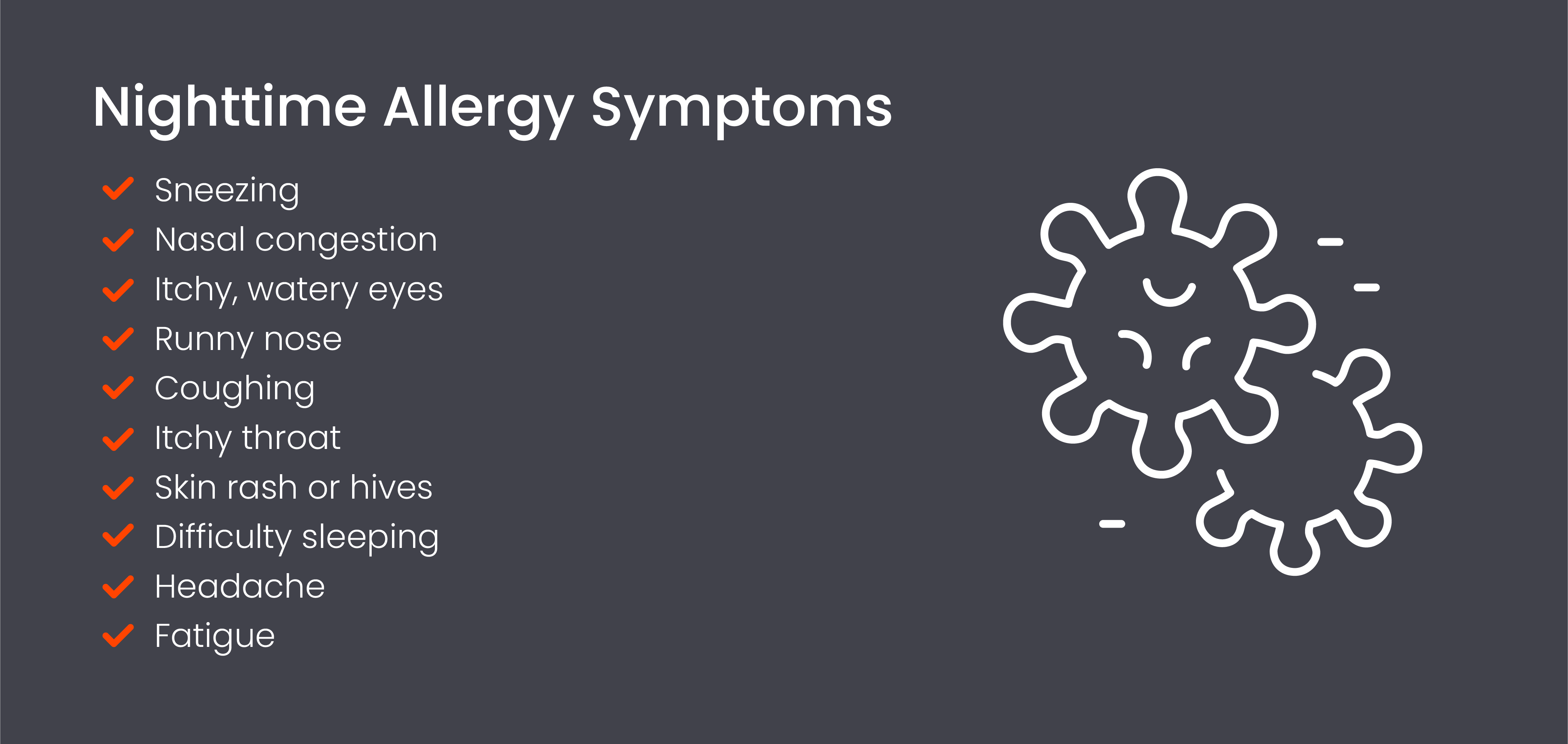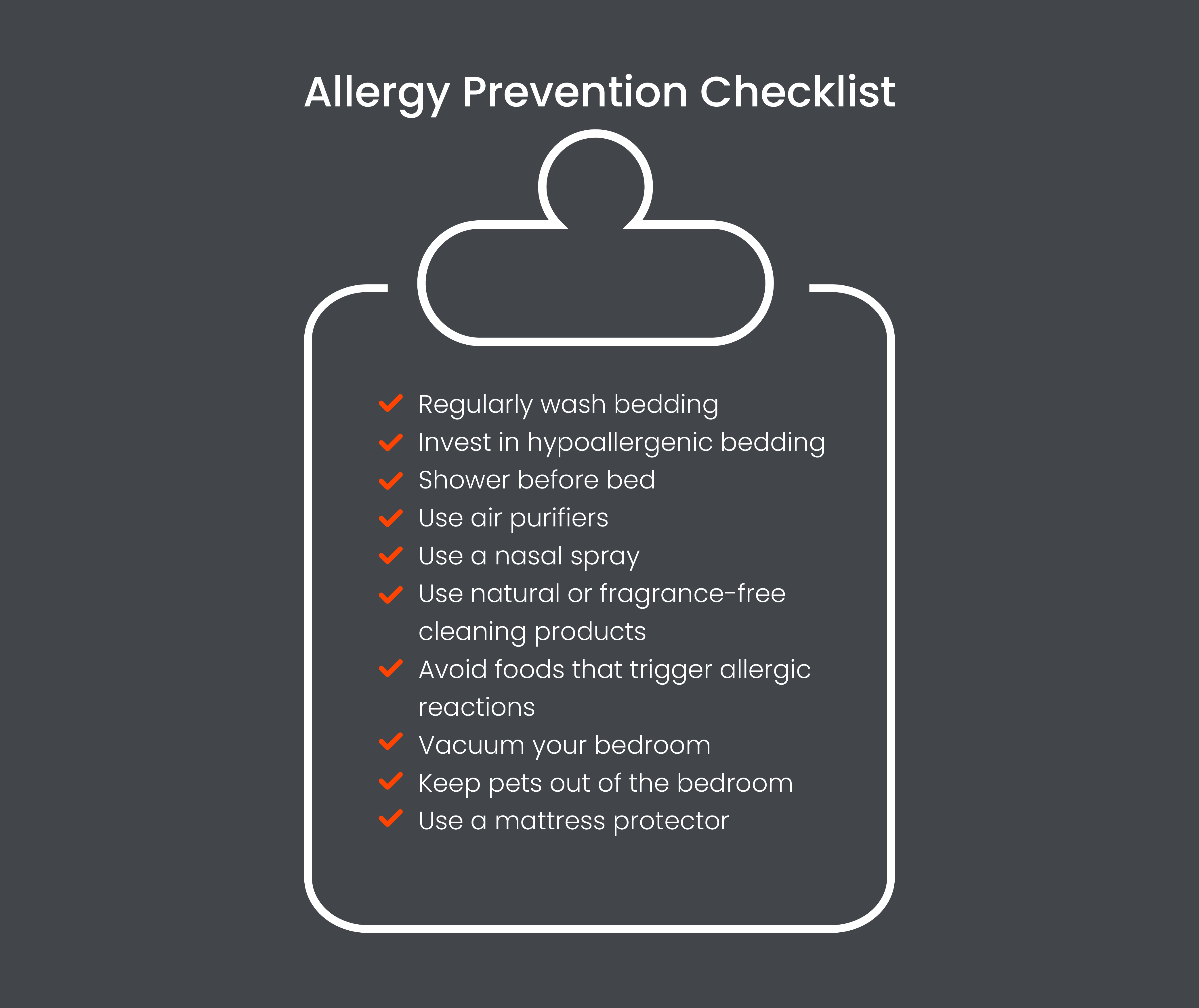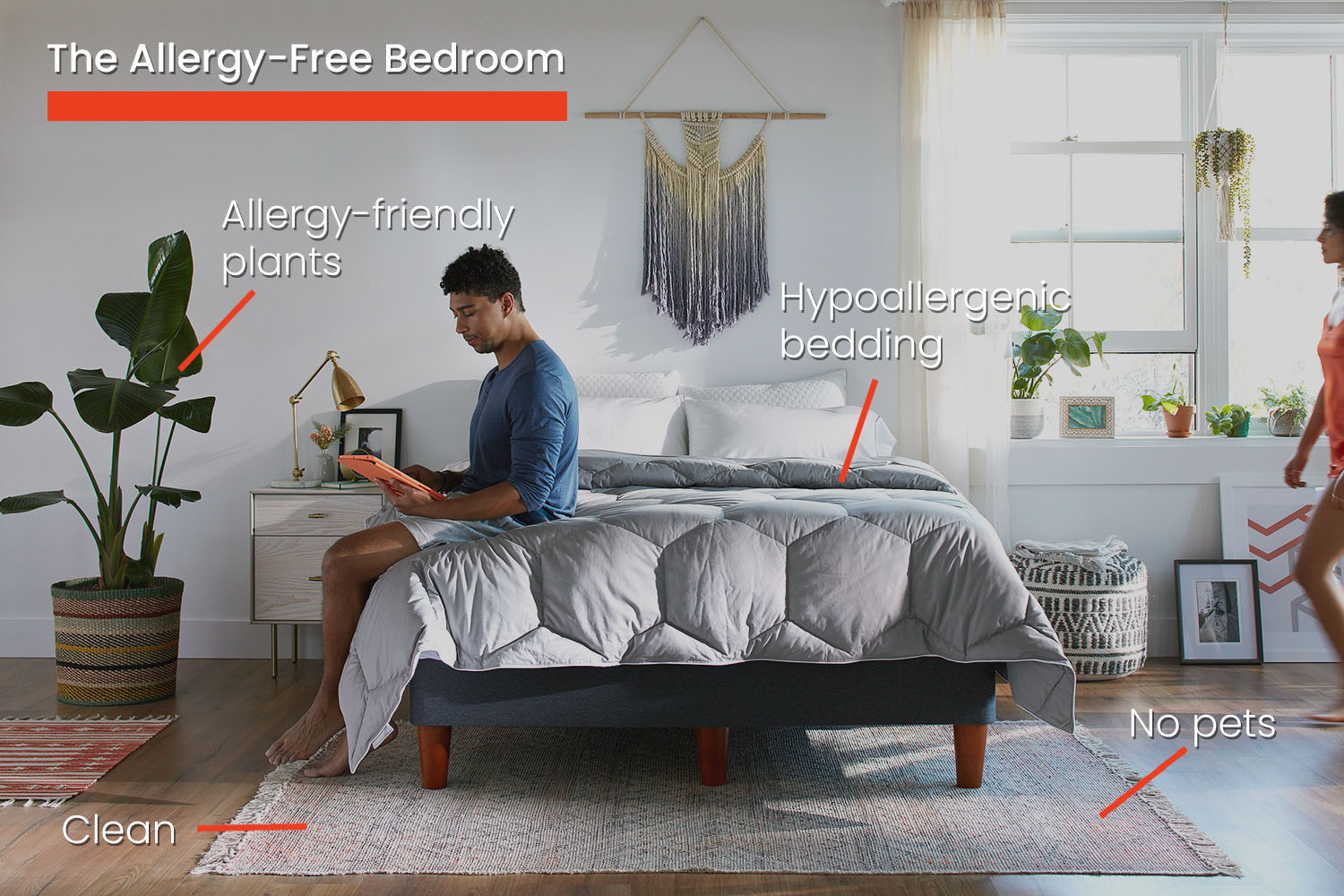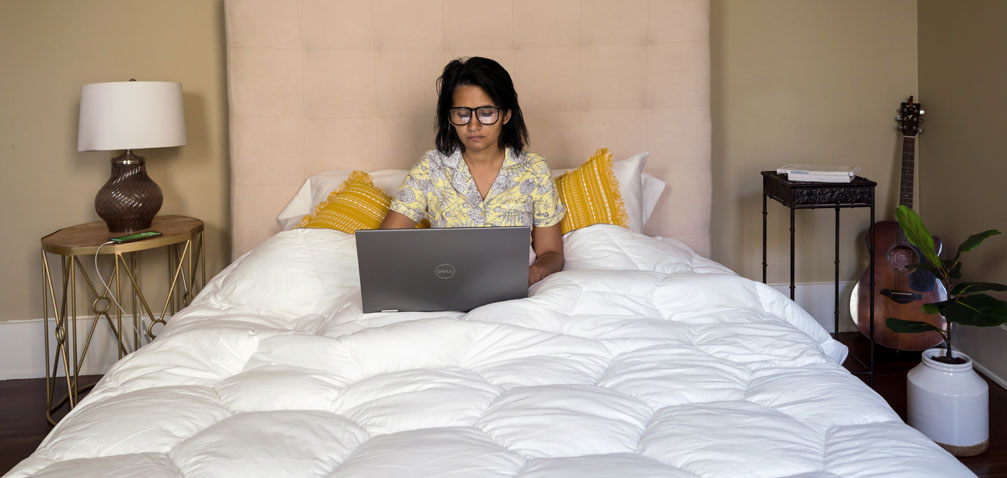- What Causes Nighttime Allergies?
- What Are Nighttime Allergy Symptoms?
- How Can You Prevent Allergies at Night?
- Wrapping Up: How to Prevent Nighttime Allergies
What Causes Nighttime Allergies?
Many people suffering from allergies can tolerate the symptoms during the day. But unfortunately, they can get a stuffy nose, itchy eyes, and sneezing when they try to go to bed at night. There are potentially many causes of worsening allergies at night, including allergens in the bedroom. Common causes of allergies at night include:
- Dust mites: Dust mites are common household allergens that feed on dead skin cells. They often live on mattresses, and allergies can occur due to a buildup of dust around your home, making allergies occur any time of year.
- Pollen: Pollen is a common cause of seasonal allergies, often worsening when pollen counts are highest in spring and summer. Pollen comes from trees, grass, and weeds, and allergies are usually worse when the weather is warm and dry.
- Pet dander: Many people are allergic to cat and dog dander, found in their saliva, urine, feces, and on their fur and skin, which is then shed in the air. If your pet sleeps in bed with you, there’s likely a large amount of dander in your bed, which could contribute to nighttime allergies.
- Dust: Unlike dust mites, dust is not a living creature. However, dust is one of the main causes of allergies at night because of a buildup of dust in your bedroom and on your mattress.
- Bedbugs: Some individuals can be allergic to bed bug bites, resulting in inflammation and pain at the bite site, severe itching, and hives.
- Cleaning products: Certain cleaning products and detergents, especially those with strong chemical odors, can cause allergy symptoms at night, including difficulty breathing.
- Mold: Allergic reactions to mold are common and vary by season. Mold tends to grow in warm, damp areas, so high home humidity in winter can cause mold growth, especially around windows. Another common location of mold is the bathroom because the steam from showers and baths can dampen the walls and ceiling.
- Certain medications: Some medications can cause allergies, resulting in hives, rash, or fever. Always review the potential side effects of your medication to ensure you know what to expect.
- Stress and anxiety: Stress can trigger the release of hormones and chemicals like histamine, which can worsen allergies. Stress is not a cause of allergies, but it can worsen your allergy symptoms.
What Are Nighttime Allergy Symptoms?
Nighttime allergy symptoms are similar to daytime allergy symptoms. However, some people’s immune systems react differently to different allergens. For example, individuals allergic to bedbug bites might experience hives, while individuals with dust or dust mite allergies typically experience hay fever symptoms, such as itchy eyes and stuffy nose.
Allergies result from your immune system thinking that common allergens are threats. Ultimately, your immune system overreacts to allergies like pollen or pet dander, producing antibodies and inflammation that result in symptoms, which your body uses to help fight illness. The most common nighttime allergy symptoms include:

- Sneezing: Your immune system forces you to sneeze as a response to an irritant in its attempt to clear your nose of foreign substances, such as pollen, dust, or pet dander.
- Nasal congestion: Nasal congestion at night is caused by inflammation, which triggers the immune system to create more mucus. This mucus’ purpose is to stick to potential threats like pollen and prevent them from entering your airways.
- Itchy, watery eyes: Your eyes can become itchy or watery due to the release of histamine into your body that causes tiny blood vessels to leak and causes swelling. Similar to mucus in your nose, the itchy, watery eyes help clear them of allergens.
- Runny nose: When your body feels threatened, your immune response may cause a runny nose to help wash germs out of your nostrils and sinuses.
- Coughing: Fluid from a runny nose and mucus are expelled from the respiratory system by coughing and sneezing.
- Itchy throat: Allergic reactions can lead to more mucus production, which can lead to postnasal drip as that mucus drains into the back of your throat.
- Skin rash or hives: Cells in the skin and mucous membranes contain histamines, which are released when someone is exposed to an allergen, resulting in a rash or hives.
- Difficulty sleeping: Allergy symptoms often worsen at night, making sleeping difficult.
- Headache: Inflammation from allergies can result in a migraine.
- Fatigue: When your immune system is trying to fight off a virus or allergen, it needs sleep, so you may feel tired during an allergic reaction. In addition, when your immune system overreacts to an allergen, it’s working much harder, which can leave you feeling exhausted.
How Can You Prevent Allergies at Night?
When allergies worsen at night, you’ll find it can affect your sleep quality. You may be unable to fall asleep or stay asleep, which can leave you exhausted the next day. Many people take allergy medication at night to help them sleep because antihistamines can reduce the inflammatory response that causes symptoms. However, some allergy medications can lead to fatigue even the next day. If you want to prevent allergies at night without medication, try the following:

Regularly wash bedding
Washing your bedding regularly can remove allergens contributing to nighttime allergy symptoms. Washing your pillowcases, mattress protector, comforter, and sheets at least once a week in hot water can eliminate dust mites and bed bugs to give you a fresh, allergen-free bed to sleep on.
Invest in hypoallergenic bedding
Hypoallergenic bedding is prone to allergens like dust, pollen, and pet dander. Hypoallergenic fabrics prevent the buildup of dust mites and other allergens, resulting in fewer allergic reactions. This bedding is naturally resistant to common allergens and inhospitable to dust mites while preventing mold growth.
There are several types of hypoallergenic bedding, including cotton, bamboo, and silk. There are several benefits of bamboo vs. cotton sheets, such as the ability to keep you cool by wicking away moisture. However, having hypoallergenic bedding doesn’t mean you should wash your sheets any less! Even the best hypoallergenic bedding won’t solve all your nighttime allergy problems, but it can reduce the number of allergens you sleep with.
Shower before bed
If you’ve spent any time outside—whether waiting for the bus, enjoying the sun, or walking to your car—it’s likely you have pollen on you. Showering before bed can help remove any allergens that have stuck to you throughout the day. Additionally, a warm shower can make breathing a little easier by opening up your nasal passages with steam.
Use air purifiers
An air purifier removes allergens from your home, targeting dust mites, dander, mold, and pollen. HEPA air filters can remove around 99% of the allergens in your home, but ensure you get the right size. Small air purifiers may not be able to purify the air in your entire home, so consider getting one that’s large enough for the bedroom.
Use a nasal spray
Using a nasal spray can provide nighttime allergy relief in the short and long term. There are several types of nasal sprays you can use to reduce your allergy symptoms at night, including:
- Decongestants: Decongestant sprays work by shrinking swollen blood vessels that cause congestion in the nose.
- Antihistamines: Antihistamine sprays relieve congestion and prevent sneezing.
- Steroids: Steroid nasal sprays reduce congestion, sneezing, itching, and watery eyes and can even reduce runny nose.
Some nasal sprays only provide short-term relief, while others are better long-term options but can take longer to kick in. If you want to try using a nasal spray to prevent worsening allergy symptoms, talk to your doctor to find the best option for you.
Use natural or fragrance-free cleaning products
As we’ve mentioned, cleaning products with strong scents can cause allergy symptoms. The odor itself doesn’t contain allergens, but strong fragrances can make allergy symptoms worse. If you must use cleaning supplies with strong odors, do it during the day and allow them enough time to dry. If possible, consider airing out your bedroom.
However, if you suffer from a fragrance sensitivity, it’s usually best to avoid strong scents altogether, especially in the bedroom. Instead, opt for fragrance-free or natural cleaning products that are better for you and the environment.
Avoid foods that trigger allergic reactions
Food allergies can cause hay fever symptoms, including sneezing, coughing, and an itchy or runny nose. They also come with other unpleasant symptoms like stomach issues, hives, and itchy skin. In most cases, food allergy symptoms are short-lived, but they can be dangerous for individuals with severe allergies. If you believe you’re allergic to a certain food, eliminate it from your diet and see if that makes a difference in your nighttime allergies.

Keeping your room clean is crucial for preventing nighttime allergies. You’ll want to remove dust, pet dander, and pollen regularly by vacuuming your bedroom and dusting everything at least once a week. Unfortunately, dust and other allergens can stick to the carpet and get trapped in it. Then, whenever you walk on your carpet, you kick those allergens back into the air. Depending on the severity of your allergies, you might have to vacuum more frequently.
Keep pets out of the bedroom
You love your pets, but that doesn’t mean they should spend time in the bedroom, especially if you’re allergic to them. Unfortunately, many people have a pet allergy, but that doesn’t stop them from being loving pet parents. Still, if you’re allergic to Fido, you should try to keep them out of the bedroom to prevent the buildup of pet dander.
Use a mattress protector

There are many reasons why you need a mattress protector. They’re not just used to prevent stains. Mattress protectors protect your mattress from allergens like dust mites, pet dander, and mold. The Layla Mattress Protector has three options: Essential, Cooling, and Full Encasement. Each has a liquid-proof barrier to prevent spills from soaking through your mattress. They’re also stain resistant and have a dust mite barrier to prevent common allergies from living on your mattress, keeping it cleaner and allergen-free.
Wrapping Up: How to Prevent Nighttime Allergies
Nighttime allergies can disrupt sleep, making you feel even worse in the morning because you’re tired. Luckily, there are several steps you can take to reduce your allergy symptoms at night to sleep better all night long.
Try Layla’s copper-infused memory foam and hybrid mattresses. Each mattress and pillow is infused with copper to kill viruses, molds, fungus, and other allergens while keeping your bed fresh, clean, and cool.



